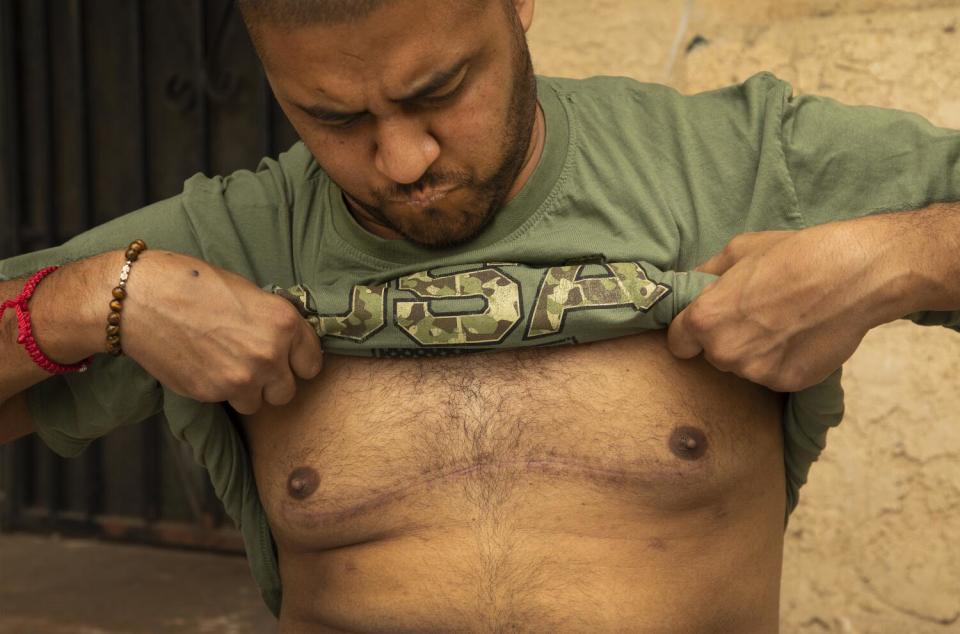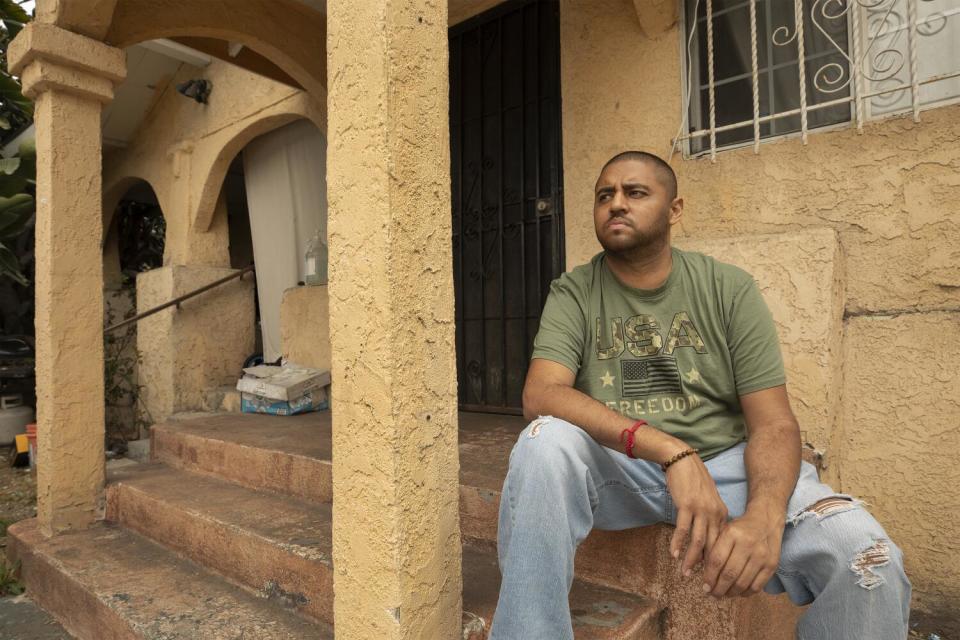Doctors said cutting countertops destroyed his lungs. He had to fight for workers' comp

By the time that Dennys Rene Rivas Williams had fallen so ill that he needed new lungs, physicians at Olive View-UCLA Medical Center expressed little doubt about what was to blame for his sickness.
Doctors had diagnosed the 36-year-old with silicosis: an incurable disease caused by inhaling tiny bits of lung-scarring silica. It was an affliction that had debilitated dozens of workers in Los Angeles County like him, who had toiled cutting countertops bound for kitchens and bathrooms.
Health officials had sounded the alarm that a new epidemic of the illness was killing young laborers amid the rising popularity of engineered stone, which is typically much higher in silica than natural slabs. In recent years, more than a dozen California workers who cut countertops have lost their lives to the disease.
Rivas Williams' medical records state that his silicosis was due to "engineered stone fabrication/cutting," with a doctor advising him to quit his job to prevent further damage.
Yet Rivas Williams had been turned down when he applied for workers' compensation, which is supposed to cover medical care and other benefits for laborers injured on the job. Attorneys representing the young father were galled, asking where else he would have inhaled so much silica.
Rivas Williams said that the Pacoima shop where he worked was blanketed in dust, and that he and other workers were offered only flimsy masks, rather than protective respirators. In January, he received a double lung transplant — a lifesaving surgery but one that often means only an additional six years of survival.
Silicosis has been known as an occupational illness for centuries, afflicting miners, stonecutters and others exposed to silica dust.
The overwhelming majority of cases are tied to work, said Dr. Jane Fazio, a pulmonary critical care physician and UCLA researcher. Among countertop cutters, if "someone has this job and they have silicosis, it should clearly be presumed to be work-related."
Yet as California sees surging numbers of young workers suffering from the disease, many have not successfully tapped workers' compensation. Assistance can include medical care, disability payments and death benefits for families.
Fazio and other researchers analyzing dozens of cases of California countertop workers suffering silicosis found that only 13% had workers' compensation benefits when diagnosed and treated. Nearly half kept working in the industry even after getting the diagnosis.
Read more: California workers who cut countertops are dying of an incurable disease
Workers' compensation is supposed to ensure that if workers are harmed on the job, "they don't have to swap their livelihood for their health" and "can get access to medical care and time away from work and disability and other kinds of resources they may need to make themselves whole again," said Kevin Riley, director of the UCLA Labor Occupational Safety & Health Program.
California employers are required to provide workers' compensation benefits for their employees, typically by buying insurance coverage. A state fund can handle such claims if a business flouts the requirements, but advocates say many workers — especially immigrants — fear retaliation for even pursuing the benefits.
And workers' compensation attorneys say lodging a claim is no guarantee that laborers will get aid quickly, even for a disease roundly recognized as stemming from work. Lawyer Gary Rodich said this summer that his firm was representing more than a dozen workers with silicosis who were denied workers' compensation benefits when they applied — including Rivas Williams.
Before he got his diagnosis, Rivas Williams had filed a claim that mentioned damage to his lungs along with "repetitive work" injuries to his knees, shoulders and other parts of his body, aided by a different attorney. The denial letter from Amtrust North America said there wasn't enough evidence that "your alleged injury resulted from your employment at Primus Marble," the shop where he was working.
Shortly after he was diagnosed with silicosis, Rivas Williams submitted an amended application with the help of Rodich. In medical reports obtained for his case, doctors have drawn a direct line to his work cutting countertops. One wrote that his silicosis was "100% work related."
Amtrust said in May that his case "involves several complex issues our claims team is working diligently to resolve." It did not respond to questions from The Times about what those issues were.
Read more: Engineered stone counter tops are killing workers at high rates. What can consumers do about it?
Rivas Williams' state disability payments ran out last year. In January, his attorneys accused the insurance company of "unreasonable and/or frivolous delay" in a court filing, saying it had left him on the verge of homelessness. At that point, nearly a year and a half had passed since his initial claim.
That same month, according to his attorneys, Amtrust agreed to pay temporary benefits as the two sides continued negotiating. Amtrust said in a May email that "we are confident a resolution will be reached soon."
Rivas Williams has to take an array of pills morning and night to prevent his body from rejecting the new lungs. The medications disarm his immune system, leaving him vulnerable to other threats. His doctors warn him to avoid cigarette and marijuana smoke, so he shuts the windows of his South Los Angeles home.

"I'm shut up almost all the time," Rivas Williams said in Spanish in an April interview. "I'm afraid to go out because I have no defenses."
He knows three men who have already died of the disease. When he went to say goodbye to one of them, "that mentally ruined me. I spiraled. I saw his kids cry. And I felt like I was seeing my own kids cry."
The 36-year-old said his goal was to support his children, whom he brought to the U.S. from Guatemala. Rivas Williams said he burned through savings and piled up debts after falling ill.
"Not everything in this life is money," Rivas Williams said. "But imagine if I'm not here.
"Their lives are going to change."
In June — nearly two years after Rivas Williams first filed for workers' compensation — the two sides reached a settlement. Rodich said his client declined to publicly disclose the amount.
Primus Marble, where Rivas Williams once worked, did not respond to messages seeking comment.
Read more: California countertop workers died of a preventable disease. The threat was known years earlier
As of early July, the California Department of Public Health had identified 156 cases of silicosis related to engineered stone in recent years — more than 90 of them among residents of Los Angeles County. Nearly half of those cases were identified last year alone, amid growing awareness of the silicosis epidemic.
Public health officials believe many more cases have gone undetected as immigrant workers go without care or are misdiagnosed with other lung ailments. Outbreaks of the deadly disease have erupted worldwide as engineered stone has soared in popularity.
In Australia, where an alarming surge in cases led government officials to ban engineered stone, silicosis has been categorized among "deemed diseases" for workers' compensation — those assumed to be caused by work unless there is strong evidence to the contrary.
If an Australian worker has silicosis, "I diagnose somebody. I fill out" the paperwork, said Dr. Ryan Hoy, lead physician for the occupational respiratory disease clinic at Alfred Hospital in Melbourne. "It goes to the regulator and they accept the claim. They can't deny it."
That doesn't exist for countertop cutters here. California has granted "presumptive eligibility" for workers' compensation for some ailments — such as COVID-19 illness suffered by health workers and first responders earlier in the pandemic — but not for silicosis claims from stonecutters.
In the U.S., workers' compensation differs from state to state, but the problems that silicosis sufferers in California have encountered are not unique. In one study of silicosis patients in Wisconsin, researchers found many had run into problems getting workers' compensation "and are frustrated by having to prove the work-relatedness of silicosis — a condition which seldom is acquired outside of work."
Almost all were initially rejected because medical records lacked information about their work histories, which is not routinely gathered by many clinicians, the study noted.

Too often, "doctors either don't have the time, don't take the time, or don't know how to take a complete occupational history," said Dr. Cecile Rose, an occupational pulmonologist at National Jewish Health in Denver.
Silicosis may show up years after someone is exposed, requiring doctors to also probe into past employment.
Many patients never pursue the process. One analysis of silicosis patients in Michigan, where the disease has sickened people whose work involves metal casting or abrasive blasting, found only 35% had applied for workers' compensation — and the percentage had tumbled over time. Other studies involving a range of industries have put the numbers even lower.
"Even for clear-cut injuries, only about 50% of individuals apply for compensation," said Dr. Kenneth Rosenman, chief of the division of occupational and environmental medicine at Michigan State University.

Experts said the California system tends to be smoother for workers lodging claims involving one-time injuries than for those facing diseases that developed over time. Rand senior economist Michael Dworsky estimated roughly 1 in 8 claims for workers' compensation are initially denied in California, but said rejection rates have tended be higher for illnesses tied to workplace exposure, such as cancer or heart disease.
If injured workers fail to get workers' comp, "it puts the burden on other resources. It puts the burden on your health insurance," said attorney Cheryl Wallach, a board member with the advocacy group Worksafe.
Like many California workers stricken with silicosis, Rivas Williams said he was insured through Medi-Cal, California's Medicaid program. State officials did not promptly provide figures for how much Medi-Cal pays for such care, but physicians estimated the costs of a double lung transplant exceed $1 million.
As more workers grow ill, "it's a huge strain on taxpayers, when it really should be workers' comp" shouldering those costs, said Dr. Sheiphali Gandhi, an assistant professor of medicine at UC San Francisco who has studied silicosis.
Read more: California could require licenses for stonecutting shops amid deaths of young workers
This story originally appeared in Los Angeles Times.


